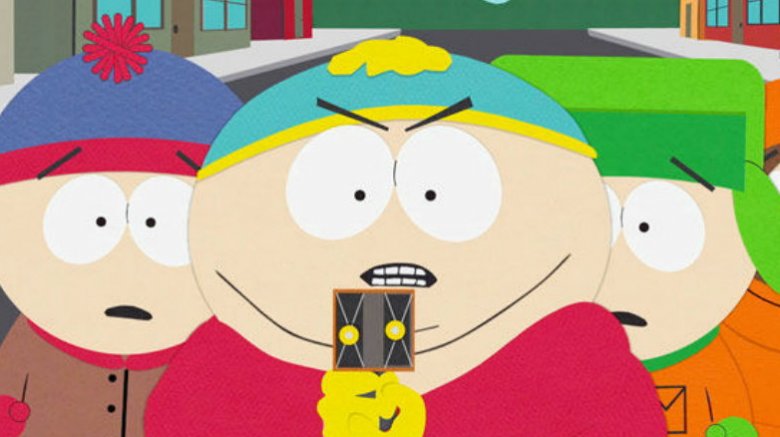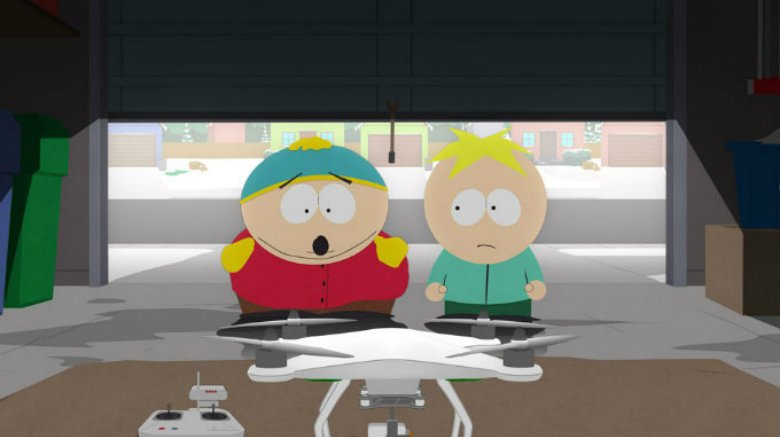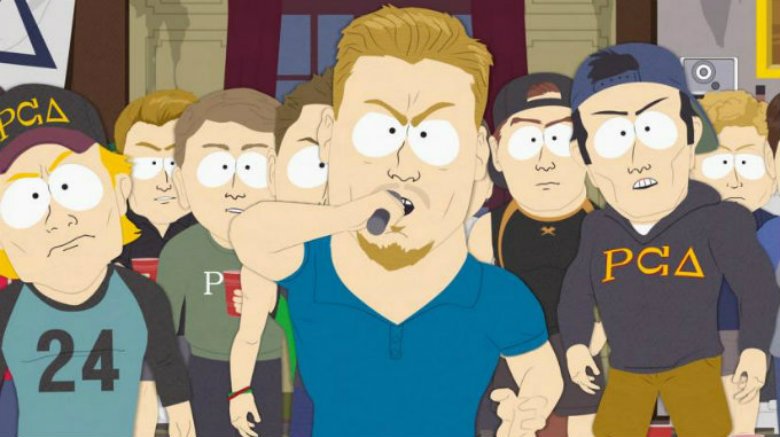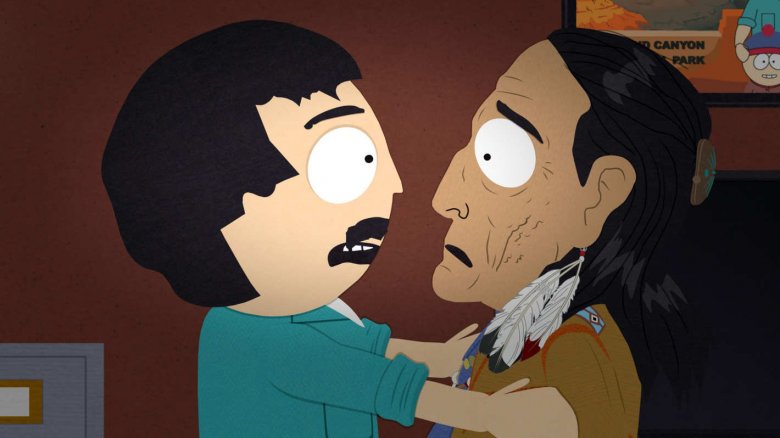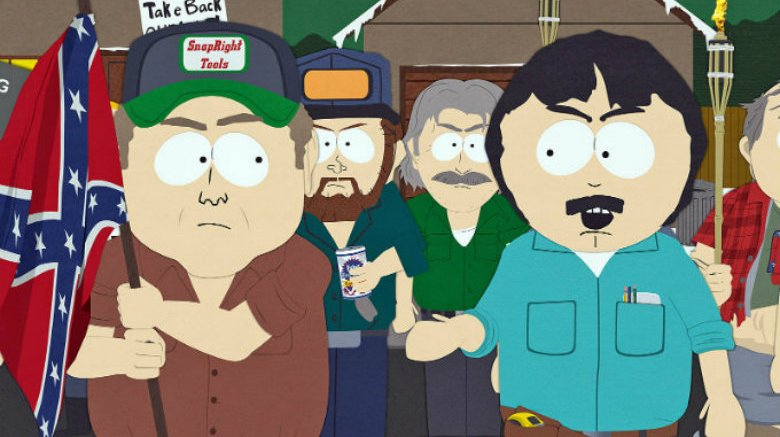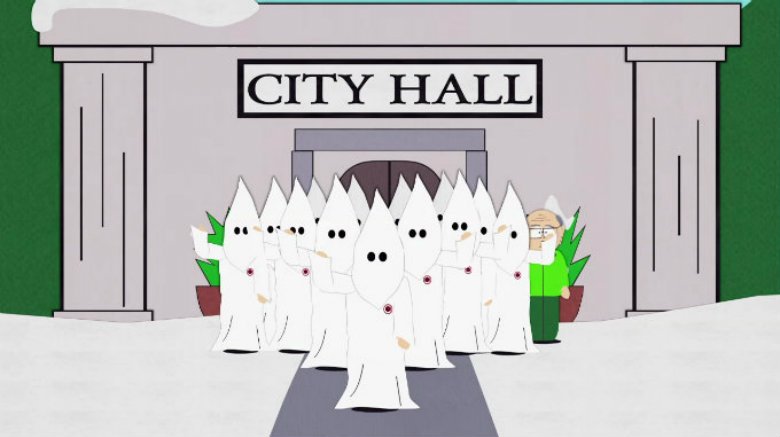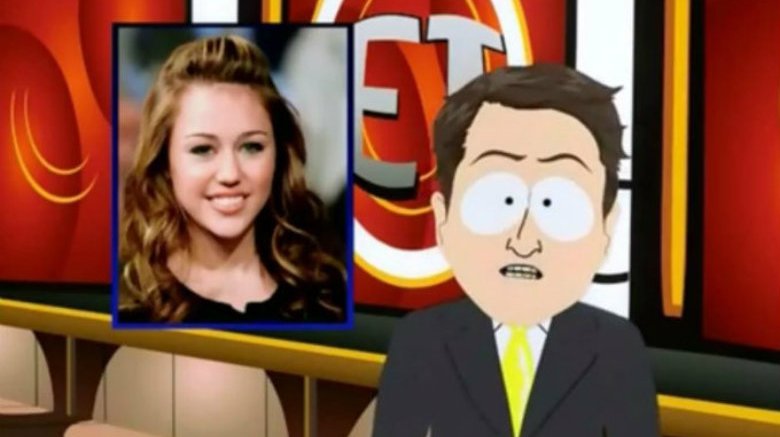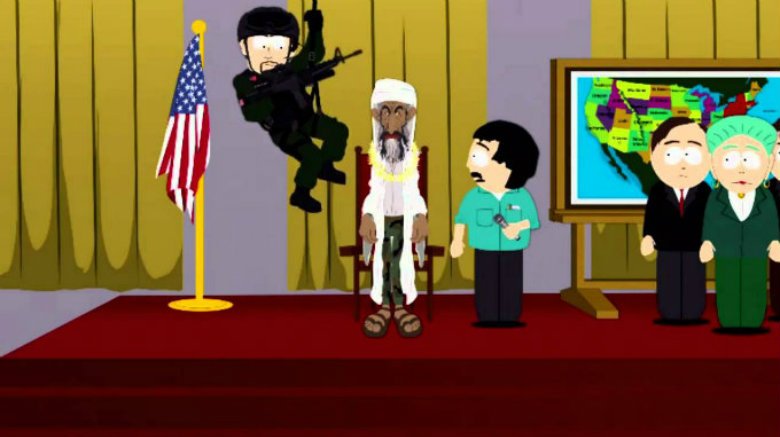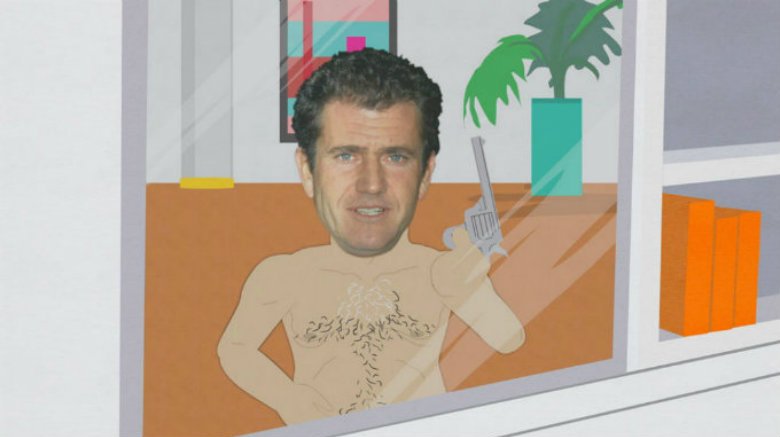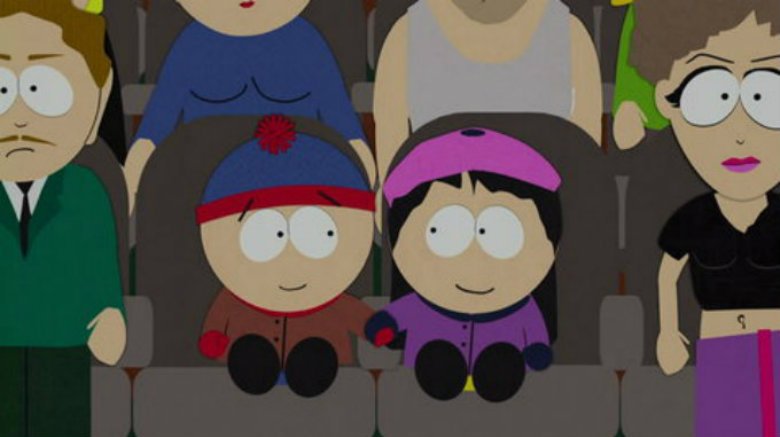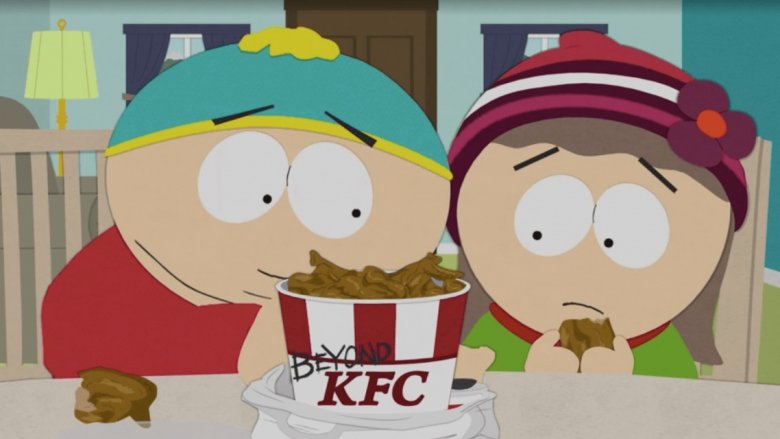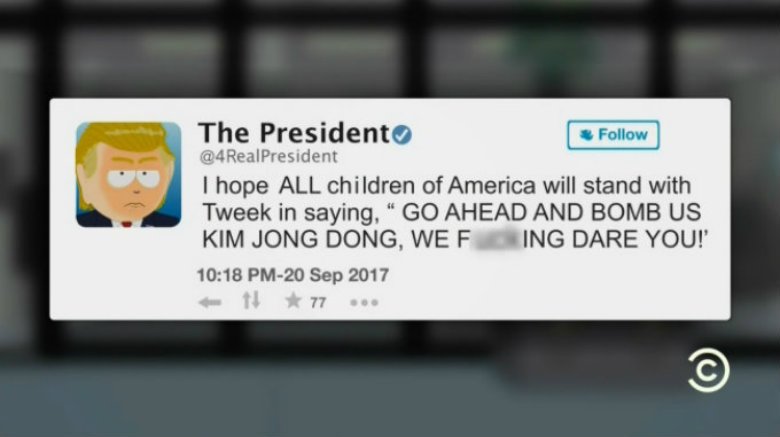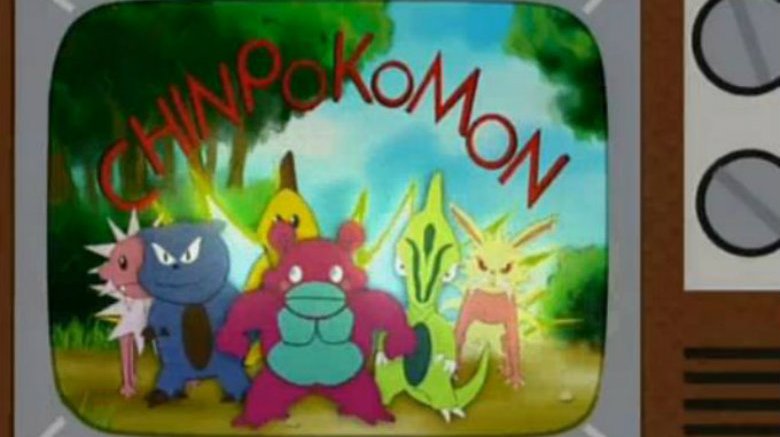Times South Park Freakishly Predicted The Future
It's strange how often people compare South Park to The Simpsons. Sure, both remain two of the most popular animated shows on television, running for decades apiece, and both appeal to a wider audience than just children. At their core, though, the two shows are surprisingly different. While The Simpsons generally hones in on the family dynamic to explore relatable issues, South Park spreads its net far wider, courting controversy by satirizing current events that few other mainstream shows would dare touch.
However, one bizarre aspect that the two animated shows do share in common is their uncanny ability to predict the future. Much has already been made in recent years of how The Simpsons has predicted everything from 'tomacco' to President Trump, but it seems as though the South Park writers own their very own crystal ball too.
South Park always feels so current due to its unique production schedule, where the creators write each episode just a week before it airs, but this approach has also helped Trey Parker and Matt Stone develop their own sense of where the national conversation is heading too. Join us as we explore all the times South Park pushed beyond topical concerns and freakishly predicted the future too.
And the gold medal for predicting drone proliferation goes to...
Just a few years ago, the very idea of seeing drones being used out in public seemed absurd, but now that this has quickly become a reality, the implications of their use are yet to be fully realized. However, there's one even scarier aspect of this that became apparent recently at the 2018 Winter Olympics, and it's the idea of drone warfare.
Quartz reported that Pyeongchang officials had been trained to take down suspicious drones by using a drone of their very own. To nullify the potential threat of bomb-carrying drones, the South Korean security team could use their own drone to drop nets over other devices that would prevent them from flying.
Back in 2014, South Park explored what could happen if drone warfare could become a reality during a Season 18 episode called 'The Magic Bush.' Airing on October 29, the story started out with the premise that the town's residents could use private drones to spy on their neighbors, but of course, things quickly escalated to the point where the police started using their own drones to shoot down other dangerous devices.
On the DVD commentary for Season 18, creators Trey Parker and Matt Stone revealed that the episode was first inspired by a random drone that flew past them while eating breakfast outside a cafe. What unnerved them both was that they had no idea who was operating the drone, prompting Parker to say that "It really felt like the future, and not in a good way future."
Correct about political correctness
South Park is perhaps most famous for pushing the boundaries of what is acceptable and politically correct, so it was a stroke of genius to introduce a new character in Season 19 called PC Principal. Obsessed with discouraging any kind of offensive material, PC Principal's mission became a driving force of the show back in 2015, tackling everything from gun rights to the gentrification of South Park.
The first episode of Season 19 premiered on September 16, 2015, back when few could have predicted that Donald Trump would ever take his seat in The White House. However, by the time the season ended, Trump's campaign had become defined by his resistance to PC culture, aiming to empower those who felt silenced by this rhetoric.
During an interview with Vulture, creator Matt Stone reiterated that South Park has "been interested in that debate for a long time," but never before had they tackled the matter so directly. In hindsight, it seems obvious that PC culture would become a key focus in the political debates that followed Trump's bid for the Presidency, but South Park proved themselves to be ahead of the curve once again.
No one is innocent
In the third episode of Season 21, the South Park team took aim at self-victimization while satirizing people who oppose Columbus Day. Titled Holiday Special, the story followed Randy Marsh as he protested Columbus Day — until old pictures of him dressed up as the historical figure suddenly came to light, which people deemed offensive. Unable to deal with this public humiliation, Marsh did everything he could to divert attention away from his hypocrisy.
Bizarrely, a very similar situation which arguably also reeked of hypocrisy hit the news just two days after the episode initially aired on September 27, 2017. Here, First Lady Melania Trump tried to donate Dr. Seuss books to a Massachusetts school, but faced resistance from a librarian who argued that the stories were racist. Just a few days later, Twitter users discovered old pictures of the woman in question dressed up as the Cat in the Hat, one of Dr. Seuss' most famous creations.
Understandably, critics of the librarian's choice were put out by the fact that she had previously supported the work of Dr. Seuss at school. What's particularly strange about this prediction is the short space of time between the episode's premiere on TV and its real-life parallel.
A monument-al prediction
Facing a lawsuit seeking the removal the Confederate symbol from their flag, lawyers for the state of Mississippi — the last in the nation to use the divisive iconography in this way — told the U.S. Supreme Court on October 18, 2017 that the battle emblem didn't violate anyone's civil rights and would continue to remain on the flag. This ongoing battle to do away with what many see as a racist symbol was tackled way back in Season 4 of South Park during an episode called Chef Goes Nanners.
First aired on July 5, 2000, the seventh episode of Season 4 revolved around accusations that suggested the town's flag was racist. Of course, South Park took the issue to further extremes than in real life, depicting an image on the flag that no one could question is racist. The symbol that Chef and Uncle Jimbo come to blows over is of four white figures hanging a black person on the gallows, which Chef pointed out "represents a time when blacks were persecuted by whites."
Eventually, the town come to a "compromise" and add some ethnic diversity to the flag. Yes, a black figure is still being hanged, but this time, other ethnic groups participate in the hanging too. While that kind of compromise would clearly never work in real life, it's fascinating to see how South Park predicted protests against the Confederate symbol would ultimately fail, at least in Mississippi.
SpooKKKy
"Here Comes the Neighborhood" wasn't the first South Park episode to feature the Ku Klux Klan, but their appearance in this Season 5 installment holds eerie parallels with real-life events that took place toward the end of 2015.
First aired on November 28, 2001, the episode depicts a class war that takes place between the residents of South Park after the town becomes a hot spot for the rich and famous. To drive these new visitors away, the townsfolk dress up as ghosts to try and scare them into leaving. In reality, though, the rich tourists all happen to be black — and the ghost costumes look suspiciously like KKK outfits.
In December 2015, several cadets at The Citadel military college in South Carolina were suspended after photos of them wearing white pillowcases on their heads began to circulate on social media. The cadets argued that the photos were part of a skit about the "Ghosts of Christmas Past," but the resemblance to Klan hoods was unnervingly similar. While it's easy to see why fictional characters might use this excuse, what's harder to understand is how people in real life could ever think it would work.
Came in like a wrecking ball
These days, it's no surprise when pop star Miley Cyrus appears in the news for courting controversy, but in 2008, the young singer was still considered to be relatively innocent. Hints at the future of Hannah Montana had begun to appear that year following a few leaked photos and her topless Vanity Fair shoot, but no one could have predicted quite how far she would go... aside from South Park, of course.
Airing on March 19, 2008, the Season 12 episode Britney's New Look focused on Miley's idol for the most part, satirizing the cruel way the media treated Ms. Spears following her 2007 breakdown. At the end of the episode, it's revealed that Britney was deliberately pushed to the brink of suicide as part of a ritual that's needed to produce a good corn harvest. Months after her death, a newsreader shines the spotlight on Miley Cyrus, claiming that she's becoming the next big pop star and hinting that she'll become the media's next target.
While Miley Cyrus didn't die to fulfill a ritual in real life, the singer's career did blow up soon after, just like the episode predicted, and a portion of her fanbase was alienated by her rapid image change and stylistic experimentations — although unlike cartoon Britney, she seems to have emerged from that turbulent period none the worse for wear.
Zero Park Thirty
Despite its comical title, the South Park episode "Osama bin Laden Has Farty Pants" was one of the most important ever produced by the show. As the first episode to air following the September 11 attacks, the pressure was on for Matt Stone and Trey Parker to continue in their usually topical vein and address the incident head on. By all accounts, the pair succeeded, and the episode was even nominated by the Emmys for Outstanding Animated Program in 2002 (they lost to Futurama).
What's most significant about this Season 5 episode, though, is the way in which the story deals with one of the main figures behind the attack. In "Osama bin Laden Has Farty Pants," the boys are mistakenly shipped to Afghanistan, and it's not long before Eric Cartman comes face to face with bin Laden. Following a Looney Tunes-style fight, Cartman tricks his adversary into wearing an Uncle Sam costume and holding a stick of dynamite. At that moment, terrorists see bin Laden dressed up and shoot him before an American soldier finishes him off.
In real life, the FBI placed a $25 million bounty on bin Laden's head in 2001, so it didn't come as much of a shock when he was eventually killed in Abbottabad on May 2, 2011 — almost a decade after South Park predicted his demise in an episode that first aired on November 7, 2001.
The anti-Semitic action hero
Mel Gibson's reputation in Hollywood has never fully recovered since he was arrested in 2006 for a DUI, shouting anti-Semitic abuse at the arresting officer. Since then, further controversy has plagued him in his personal life following the release of a tape that depicted the actor hurling abuse at former lover Oksana Grigorieva. However, it turns out that South Park already seemed to know Gibson was unhinged if the Season 8 episode "The Passion of the Jew" is anything to go by.
Following the success of Gibson's movie The Passion of the Christ, South Park tackled reactions to the film in an episode that aired on March 31, 2004, two years before the actor's arrest. In "The Passion of the Jew," Kyle is outraged by Gibson's film and demands his money back, but the director refuses, instead engaging in a range of crazy behaviors.
Clearly deranged, this version of Gibson takes great delight in twisting his own nipples and playing with his poop while dancing around semi-naked. What's most striking, though, is how Gibson deliberately stirs up anti-Semitism in this episode and his subsequent appearances on the show, long before his prejudiced beliefs came to light in real life.
Gay cowboys eating pudding
Brokeback Mountain forever changed the landscape of queer cinema when it was released in 2005, earning unprecedented mainstream recognition and three Academy Awards along the way. However, the film may not have been as unique as we all first thought, however, if an earlier episode of South Park is to be believed.
First aired on August 19, 1998, the Season 2 episode "Chef's Chocolate Salty Balls" brought the Sundance Film Festival to South Park, and each of the kids attended. While visiting the festival, Eric Cartman explicitly mentions at one point that all independent movies are "about gay cowboys eating pudding," and a clip is shown that seems remarkably prescient in hindsight.
The episode aired seven years before Brokeback Mountain hit cinemas, although Annie Proulx's source material was initially published a year earlier in 1997. When asked about this coincidence in October 2005, Trey Parker and Matt Stone laughed and told the Associated Press, "No [we're not prophets], but Cartman is." After attending Sundance a lot in the mid-'90s, it seems as though the two creators "could just tell [indie cinema] was going toward gay cowboydom." Well, they weren't wrong!
The KFC underground
In February 2018, "operational issues" forced KFC to close over 75 percent of their U.K. restaurants for a few days, depriving customers of the fried chicken they so sorely crave. Rather than wait for the chain to reopen or simply fry their own chicken, some people took more extreme measures to cope, buying KFC buckets on eBay for over $100 each.
Incredibly, South Park predicted the idea of an underground KFC market in 2010 as part of the main storyline featured in an episode called "Medicinal Fried Chicken." After marijuana is legalized, the local South Park KFC restaurant is briefly replaced by a medical marijuana dispensary, which prompts outrage from the town's residents. It should come as no surprise to fans of the show that Cartman then capitalizes on this by selling KFC buckets on the black market.
The story itself was inspired by a real-life marijuana dispensary in Los Angeles that used to be a KFC restaurant, but the fried chicken black market featured in the show came purely from the imagination of writer Trey Parker, eight years before life imitated art.
Cartoon President
President Trump regularly uses Twitter to vent his opinions, but it's rather uncanny how South Park predicted one specific message that the POTUS would write just two days before he sent it out into the world.
On September 20, 2017, a Season 21 South Park episode parodied the escalating tension between Trump and North Korean dictator Kim Jong-un in real life, but replaced the POTUS with President Garrison. In the story, Tweek is terrified that Garrison's aggressive messages could kickstart World War III, so he tries to intervene, but ends up being blamed for the President's rage toward North Korea.
Two days later, on September 22, 2017, Trump posted a tweet that described Kim Jong-un as "a madman who doesn't mind starving or killing his people," threatening that he "will be tested like never before!" While we don't know whether a schoolkid in Colorado sent Jong-un cupcakes to alleviate the severity of this message, it's uncanny how similar this exact tweet was to the messages sent in the South Park episode "Put It Down" that aired just two days earlier.
Gotta catch 'em all
After Pokémon Go blew up as a fad in the summer of 2016, Vulture asked South Park creators Trey Parker and Matt Stone whether they would ever tackle the game in future episodes. Their response? "We made fun of Pokémon Go in 1999!"
On November 3, 1999, an episode from Season 3 called "Chinpokomon" aired for the first time, taking aim at the popularity of the Pokémon video game franchise. In the story, the South Park kids become obsessed with a Japanese fad called Chinpokomon and proceed to buy every item of merchandise possibly related to the game. However, it turns out that the Chinpokomon devices track each player's location and send the information back to the Japanese developers — much like Pokémon Go does in real life.
The episode was nominated for an Outstanding Animated Program Emmy in 2000, but even then, few could appreciate how clever and forward-thinking the script really was until its prescient ideas came to fruition more than 15 years later.
